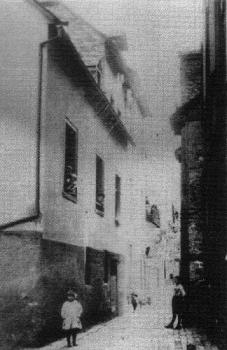
Documents referencing the Jews in St. Goar and Werlau go back to the High Middle Ages (1383) and into the 16th Century. A synagogue or a prayer house existed in St. Goar in the 18th Century, at the latest, but written reference to it is first found only in 1830. The Jews of St. Goar dedicated a new synagogue on the 9th of August 1844, which was attended by the Jews of Werlau, as well. Approximately ten years later, however, the building had to be abandoned in favour of pending railway construction.
A new synagogue was eventually established in a small residential home on the “Obergasse” in 1876. In the 1920s, however, worship services were being held only rarely because community membership was so low that the required Minyan (at least ten Jewish men) could no longer be assembled.
SA henchmen forced their way into the synagogue on the evening of the 9th of November 1938 and began destroying it; soon receiving support from other “helpers”: The interior furnishings were demolished, the Torah scrolls were burned in the street and valuables were stolen. Yet, the synagogue structure was not set on fire due to concerns for the neighbouring buildings.
It is used today as a residential home and a commemorative plaque in remembrance of the building's history has been mounted close by.
A prayer hall established in a private home in Werlau was also devastated in 1938. Today, a memorial stone evokes memories of the “former Jewish residents” of the town as well as its German-Jewish history.
Photo documentation: Doris Spoirmann, St. Goar/Biebernheim
